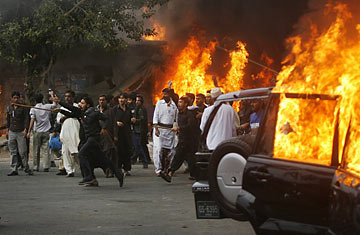
An angry mob charges towards police after setting ablaze shops and vehicles at the site of a suicide bomb attack on a procession of Shi'ite Muslims commemorating Ashura in Karachi on Dec. 28, 2009
Pakistan was rocked on Monday, Dec. 28, by a vicious suicide bombing that killed at least 32 people and injured almost twice as many amid a major annual mourning procession of the country's minority Shi'ites in the heart of Karachi, the largest city and commercial center in the nation. As the death toll mounts, the country's political leaders have united in their condemnation of the attack. It was the third such assault in Karachi in as many days, crushing the city's hopes of evading the current wave of bombings, deepening fears of further sectarian attacks and underscoring the militants' deadly ability to strike seemingly anywhere at any time.
In chilling scenes, television footage captured the moment that the bomber struck. A tightly packed crowd, dressed in black and holding banners aloft, solemnly shuffled down one of Karachi's main roads. Some performed the matam, beating their chests as they mourned the death of Imam Hussain, a grandson of the Prophet Muhammad, who was killed in 680 A.D. in the Iraqi city of Karbala. On all four sides, well-armed policemen and paramilitary guards surrounded the marchers. But even beefed-up security measures were unable to thwart the bomber, who blew himself up near the back of the crowd. After a loud blast, large plumes of white smoke filled the air. Some of the marchers fell to the ground, while others fled in a panic. "It was an inhuman act of terrorism," Shah Mahmood Qureshi, Pakistan's Foreign Minister, told TIME. Suspicion immediately fell on the Pakistani Taliban.
The failure to stanch the anti-Shi'ite bloodshed has drained ordinary people's faith in the government. In its place, there is now raw anger. After ambulances rushed the dead and wounded to hospitals, some of the marchers defiantly continued. Less patient ones lashed out at government officials and journalists in the area, local media reported. Across Karachi, large buildings and more than 15 cars were torched. The fear is now that the city may see more such attacks and tit-for-tat reprisals. "I want to appeal to the people, to my brothers, my elders, to stay calm," said Mustafa Kamal, the city's mayor. "I am hearing people are clashing with police and doctors. Please do not do that. That is what terrorists are aiming at. They want to see this city again on fire."
Since the 1980s, Pakistan's Shi'ite community has been subjected to brutal attacks from extremist Wahabi-inspired militant groups that regard them as heretics or apostates. With the emergence of the Pakistani Taliban, that threat has intensified. In recent years, the town of Parachinar in the wild tribal areas along the Afghan border, Baluchistan province's capital of Quetta, Dera Ismail Khan in the northwest, and parts of Punjab have been among the areas scarred by anti-Shi'ite attacks. The latest bombing will call attention to the Taliban's long-standing but murky presence in Karachi. Until this past week, they have resisted mounting attacks in the city, preferring to use the sprawling metropolis as a base for recruiting, smuggling weapons and racketeering for funds. Now there is fear that the city's Pashtun-speaking communities (where the Taliban find refuge) may come into conflict with Karachi's huge Urdu-speaking majority.
Monday's bombing comes at a sensitive time for Pakistan, as President Asif Ali Zardari appears to be battling for his political survival. A day earlier, while marking the second anniversary of the slaying of his wife, former Prime Minister Benazir Bhutto, Zardari raised a defiantly worded warning that democracy was imperiled. Since the Supreme Court earlier this month struck down an amnesty that had cleared Zardari and some of his closest aides of long-standing corruption charges, pressure has increased on the presidential palace, slowly eating away at the occupant's authority and raising the prospect of a destabilizing clash between the government and the judiciary.
Speaking near his wife's grave on Sunday, Dec. 27, Zardari railed against unnamed forces that were conspiring to derail his shaky and unpopular government and Pakistan's democracy. Writing in the Wall Street Journal the same day, Zardari said that "a litany of ancient charges of corruption — the modus operandi of past plots against every democratically elected government in Pakistan — now threatens to undermine the legitimacy of our government." The blame, he added, lies with those who refused to stand with him against terrorism and his opponents in the media.
In recent days, the President's allies and some observers have lashed out against the Supreme Court, accusing it of overstepping its role by lifting the amnesty on Zardari's corruption charges. A potentially destructive confrontation between the two is now feared. Meanwhile, the political opposition is slowly ratcheting up pressure on Zardari to step down, something he is no mood to do. The bad news for Pakistan is that, yet again, its rough-and-tumble politics may mean that not enough attention will be paid to defeating the terrorists who hit Karachi on Monday.
